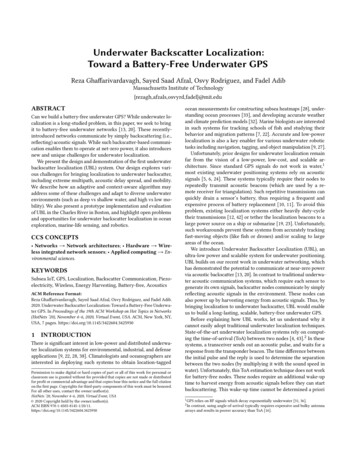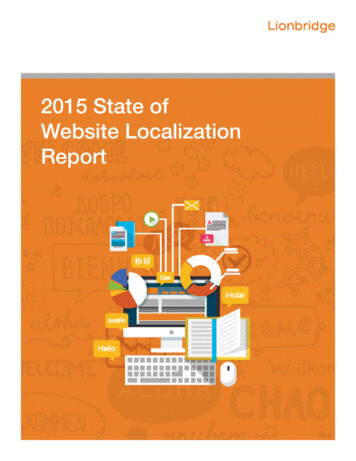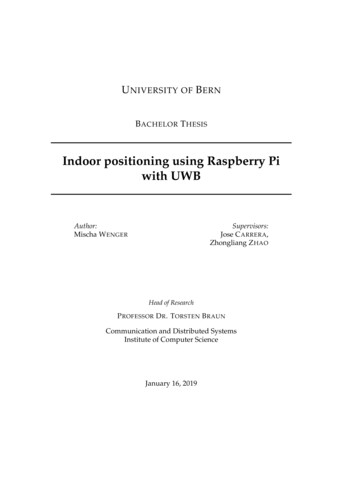
Transcription
SOFTWARE LOCALIZATION: NOTES ON TECHNOLOGY AND CULTUREKenneth KenistonKenneth Keniston is Andrew W. Mellon Professor of Human Development and Director of Projects in the Programin Science, Technology, and Society at the Massachusetts Institute of Technology.Copyright 1997, Kenneth Keniston. DRAFT: Do not quote, cite or reproduce without permission.January 17, 1997Working Paper #26Program in Science, Technology, and SocietyMassachusetts Institute of TechnologyCambridge, Massachusetts 02139The comments that follow are intended as a preliminary map of some of the territory to be explored if culturallocalization is to be understood.Introduction"Cultural localization" is the process whereby software written in one culture is adapted to the needs and outlooks ofanother. As one correspondent puts it, "Culturally localized software is indistinguishable from software written by amember of that culture." Cultural localization presupposes linguistic localization, a topic well studied, but may gofar beyond it. For software developed in one culture can carry embedded cultural assumptions that may seem alienor even inimical to users in other cultures. At present, cultural localization almost always entails the localization ofpackaged software originally written in English by American programmers, since U.S. software dominates the worldmarket. But there is no logical reason why this should be so; the problems of localization from, say, Hindi to French,or German to Xhosha, are not inherently different from those of localization from English to Chinese.
The study of cultural localization is important for at least three reasons.- Intellectually, it is important to try to understand the assumptions built into the software that is assuming increasingimportance in our lives. Just as we seek to understand how television affects how we perceive, think, and behave, soit is important to study how the software with which more and more people in the world work for more and moretime each day influences choices they make, assumptions they take for granted, and choices they do not or cannotmake. What values, if any, does software carry apart from the ability to solve problems? How does it affect the waywe think, work, and live? Is it true, as social scientists argue, that software, like other technologies, is a covertcarrier of culture and even of politics? Put differently, it is important to begin to "deconstruct" software, just as wenow "deconstruct" film, television, and literature.- Economically, the United States holds the dominant world position in packaged software production and exports,with about three quarters of the world market and exports valued at many billion dollars in 1995. Americanprogramming languages and operating systems are almost universally used across the world. Most major Americansoftware companies devote important resources to "internationalization"; current and new versions of Windows, forexample, are planned in dozens of languages. But precisely because of the economic importance of U.S. software,American insensitivity to the perceived cultural messages in software could (and should) lead to reluctance on thepart of other nations, developed and developing, to import this software. American software manufacturers areunderstandably concerned that such reluctance could lead to software import restrictions or to "local content"software requirements like those that now exist in some nations with regard to television and film.- Politically, software localization requires confronting difficult and ambiguous international and domesticcontroversies. In many nations, cosmopolitan, internationally-oriented business, professional and intellectual eliteshold dominant positions. For them, "localization" to vernacular languages and local cultures may be unnecessaryand/or even undesirable, since English (or French, or Spanish, or another European language) may provide the bestpossible access to the rest of the world. Another broadly political question is the choice of languages in developingcountries: for example, should children in the Andean regions of Peru use software localized to Quechua or
Spanish? Should businesses, banks, or schools in Calcutta adopt Bengali, Hindi, or English software? How can thelegitimate interests of local, tribal, and historic cultures be balanced against the reality of an increasinglyinterdependent, multinational, and global economy and culture? At what level -- national, regional, local, individual-- and by whom should software decisions be made? Should developing countries try to institute uniform softwarepolicies or, like some industrial nations, let so-called "market forces" prevail? What are the educational,technological, and infrastructural preconditions for developing nations to assert control over the software usedwithin their borders?Software localization, often treated entirely as a technical problem of technology transfer, opens up a series ofbroader intellectual, economic, and political questions, each of which takes a special form in developing nationswhere educational and infrastructural resources may be limited.The thoughts that follow are based on discussions with colleagues in Latin America, on a preliminary effort toexplore the rather meager literature on localization and cultural issues in software, and, most of all, on Internetcorrespondence with professionals and scholars interested in the issue -- some professional localizers working formajor and minor software firms, others academics who have studied, or are interested in, how culture affectssoftware. A preliminary posting of a query about cultural localization on the ISWorld Listserv produced a flood ofuseful replies from researchers and workers the world over; contact with some members of LISA (the LocalisationIndustry Standards Association, Geneva) produced another set of useful responses. Although largelyunacknowledged here, the Internet correspondence that followed has provided many of the ideas in this paper.These thoughts are an agenda rather than a research proposal. My goal has been to consider a few of the broad issuesposed and pointed to by the examination of cultural localization, and in particular to place those issues in twoframeworks. The first is the framework of the contrast between the cosmopolitan, "telectronic", internationaleconomy and culture on the one hand and local, tribal, at times fundamentalist cultures on the other. The second isthe framework of sub-cultural multiplicity and variety in every society in the world, a framework that requires us todistinguish purchasers from users, general public from hackers, elites from locals, leaders from followers, speakers
of the official language from speakers of the vernacular, and so on. This pluralism within cultures necessarilycomplicates the task of studying cultural localization.This essay is divided into the following sections:-- the international role of American packaged software-- technical and cultural localization-- some "cultural" examples-- culture, sub-culture, and hacker culture-- internationalization, "Americanization", and local cultures-- pro- and anti-Americanism-- protectionism, copyright, and free trade-- hardware versus software-- English speakers and non-English speakers-- users versus purchasers-- is localization always desirable?-- the special problems of the Net and the Web-- the future of localization-- research orientations-- outcomes
-- endnotes with bibliographic discussion.What follows is incomplete and subject to revision. As befits a working paper rather than a published article, I haveat times made claims that I cannot fully substantiate, left footnotes incomplete, and stated dogmatically arguments ofwhich I am in fact less than sure. I hope readers will react critically, correcting errors of fact and assumption, andcontributing to the further study of this topic. The Endnotes provide an indication of some of the works I have founduseful in thinking about this topic.The International Role of American Packaged SoftwareSales of American packaged software abroad constitute a multi-billion dollar market, with the promise of steadyfuture growth if American software continues to be preferentially adopted in other nations. At present, the UnitedStates holds the dominant, indeed in some areas an almost monopolistic, worldwide position in the production ofprogramming languages, operating systems, and, to a lesser degree, broad-based applications.1 Operating systemslike DOS, Windows, OS2, UNIX, and Apple systems are of American design; so are most major third and fourthgeneration programming languages; most of the widely-used word processing, hypertext, spreadsheet, multimedia,Web, and other high-level languages are American; finally, specific applications are usually based on Americanoperating systems and English-language programming languages.The rapid spread of the Internet and more recently the World Wide Web has tended to reinforce the dominantposition of English-language programs and communication systems. In fact, of course, messages can be sent in avariety of languages via the Internet; Web pages can be constructed in Korean, Thai, Farsi, Urdu, and Arabic as wellas English, French, or Spanish. But in practice, and in part because of the technical problems of using ideographic ornon-roman character sets, right-left or vertical scrolling, etc., on systems and search engines originally designed for
English or West European languages, Internet and the Web tend to be dominated by English-language -- and ingeneral by American -- designs and ideas. A recent article reports that 89 percent of Internet addresses are located inonly four primarily English-speaking countries (U.S., Canada, U.K., Australia); and an impressionistic survey ofpersonal Web sites of students at several major universities in the People's Republic of China shows that most ofthem are, in whole or in part, in English.2 Efforts by Japanese and European software manufacturers to challenge theinternational hegemony of American packaged software have so far not been successful. Although there are a fewnotable exceptions like SAP, a German program, in general programmers like users have preferred to work fromEnglish rather than Japanese, French, or German.3But the very success of American-based software creates problems of its own. If, as American manufacturers anddesigners hope, the growth of American software sales and licensing abroad is to continue, at least two basicrequirements must be met: both have to do with what is commonly called "localization" or "internationalization" ofprograms.Technical and Cultural LocalizationThe first and generally used meaning of "localization" has to do with the translation of programs originally writtenin and for one language into intelligible and user-friendly versions in and for another language. We may call this"technical localization", inasmuch as it usually entails, for example, creating other-language versions of U.S.English language programs, with appropriate local character sets, numbers, scrolling patterns, dates, colors, boxsizes, etc.Localization was initially approached by American software firms as an "add-on"; i.e., after the original programwas fully functional in English, "localizers" were put to work to produce a Spanish, French, Japanese, etc. version.But programmers soon realized that such ex post facto solutions were inadequate; they often produced absurdresults; and in many cases they required the re-writing of source code, a costly step that could have been avoided
had future internationalization been part of the initial programming plan. Like many other authors, for example,Kano,4 writing primarily about Windows, argues that localization must be part of the earliest design stages of anyprogram, which must be written so as to make internationalization possible without rewriting the program's sourcecode. The importance of this issue can be seen at major firms like Microsoft, which currently release dozens oflanguage versions of new (or upgraded) operating systems and applications.Anyone who has tried to work with foreign-language translations of American programs -- be they operatingsystems or applications -- can attest that the problems defined here as "technical localization" are far fromuniversally solved. Absurdities abound; programs that operate well in one language, with one set of characters, crashin another; non-English speaking users may be presented with unintelligible, awkward, or English-language-onlyhelp, tutorials, or documentation; and so on. Yet most of these problems are, at least in principle, resolvable by thekinds of strategies suggested by Kano and others: planning for internationalization at the earliest stage of writingsource code; consistent interaction of internationalizers with source code programmers; extensive use of indigenouslocalizers; back-translation of translated texts; adequate beta testing of localized programs; and so on.5If "technical localization" is complex, expensive, and demanding, the second aspect of localization, which I will call"cultural localization," is even more complex, demanding, difficult even to define clearly, and largely unrecognizedin the literature on localization and "user-friendliness".6 By cultural localization I mean the adaptation of programswritten in one language by members of one culture to another language and another culture in such a way that theyseem fully consistent with the assumptions, values, and outlooks of the second culture. As the Europeancorrespondent quoted earlier put it, a culturally localized program "should be indistinguishable from a programwritten by members of that culture."Of course, if we view software as nothing but a culturally-neutral tool for solving universal problems, then culturallocalization is a non-issue, like addition and subtraction. Indeed, there is clearly a "gradient of culture" that runsfrom relatively technical and universal programs at one extreme to programs laden with cultural content at the otherextreme. Thus, programs for mathematical and statistical operations, like programs in basic science, are likely to berelatively constant regardless of culture. At the opposite extreme, management support systems, educational
programs, and accounting programs, which must adjust for very different assumptions in different cultures, are whatClaude Pesquet of DEC terms "more prone to cultural misfit".7But even in the case of something that would seem so fundamental as an operating system, "cultural" differences -specifically, assumptions on the part of program designers as to the capabilities and desires of users -- clearly makea large difference in the program that results. Anyone who doubts that "technology carries culture" need onlyexamine the different "cultural" values and assumptions about users embedded in the early versions of two majorcompeting American operating systems, initially implemented by Microsoft (DOS) and MacIntosh (Apple). Theseare, of course, not "international" cultural differences, but they point to the central role, in this case, of theassumptions of programmers about users in developing a complex computer operating system.Not only is cultural localization complex, problematic, difficult to define, and largely unstudied, but it could wellturn out that the negative evaluation of U.S.-written programs on "cultural" or "political" grounds will emerge as amore potent reason for not buying or not using these programs than any success or failure of technical localization.Some "Cultural" ExamplesExamples of cultural localization may help with an initial definition of the problem.1. About a decade ago, a small Central American country embarked on a program of computerizing its primaryschools.8 Requests for proposals were sent to major computer manufacturers. The proposal submitted by IBM, usingLOGO in collaboration with its author, Seymour Papert of the Massachusetts Institute of Technology, was acceptedbecause it addressed the concern that programs imported from North America would increase the already largedominance of North American culture in this nation. LOGO is of course a programming language; it was adoptedbecause it was judged by local educational authorities to be "culture free".Now, ten years later, that same nation faces new problems of how to avoid "North-Americanization" as it begins todevelop connections for its high schools with the largely English-based Internet and Web. To be sure, educational
authorities in this nation often find it difficult to articulate precisely the "North American" values they see containedin the software or information they do not wish to import. But they stress their own national traditions ofcollaboration, of peaceful democracy, of caution, and of cooperative problem-solving as values that are poorlyexpressed or even subverted in some North American software. Equally important, of course, only a few studentsspeak fluent English, but most Internet and Web resources, including the major search engines, presuppose theability to read and write English.2. The newsletter, "Information Technologies in Developing Countries", covers a wide range of issues relevant tothe localization of packaged software. Many of these are studies of key industries in developing nations ordiscussions of the technical or educational requirements for software development in the less developed countries. Itis nevertheless noteworthy that cultural concerns recur in this technical context. For example, at the recentInternational Federation of Information Processing (IFIP) world congress in Canberra, a panel of members fromVietnam, Australia, India, Chile, and Barbados attempted to identify key issues in the use of emerging informationtechnologies in developing countries. The participants expressed several anxieties about current trends ininformation technologies; e.g., that they will "widen the north-south gap further and inhibit the developing countriesfrom integrating into the global economy", that direct foreign investment to create information infrastructure mightprovide an avenue for "cultural invasion through such highways", that in the past "infrastructure meant for socialpurposes like education was eventually hijacked by the entertainment industry", and "the information highways maywiden the gap between the rich and poor segments within a developing country."9 Another discussion of trainersof information analysts in Africa, organized by the University of Nairobi in cooperation with IIM Ahmadabad,expressed the concern that the "Information Super Highway (ISH) might therefore turn out to be another media forcultural imperialism if care is not taken."10These apprehensions relate above all to the emerging information technologies like Internet and Web, but they alsoapply to software. The developing nations have long and sometimes unhappy experience with imported technologiesthat promised to alleviate local economic and cultural problems, but that in the end perpetuated or increased thedominance of foreign economies and cultures.
3. A British correspondent comments that since the Bangemann report in 1994, the European Commission hasbecome "very worried" about (American-) English-language cultural hegemony, particularly in the field ofinformation technology. He reports a number of EC-funded initiatives to try to reinforce the linguistic and culturaldiversity of Europe, e.g., that the Council of Ministers of the European Nations is shortly to be asked to endorse anew program for a "Multilingual Information Society". Today, for example, France, always protective of the historicintegrity of its language, culture, and industry, insists that imported software be fully localized for France. Europeanusers, programmers, and purchasers are understandably concerned about American dominance in informationtechnology, and are actively and officially seeking ways of counteracting it.4. In 1992, when it opened its Beijing office, Microsoft introduced Chinese-language programs that used theMandarin character set used in pre-revolutionary China and still used today in Taiwan. But the government of thePeople's Republic of China (PRC), after assuming power in 1949, had modified these traditional character sets,introducing simplified characters now universally used in the PRC. PRC authorities were therefore predictablyoffended by Microsoft's practice that programmers in Redmond, Washington, rather than local agents, definecharacter set standards.11 The PRC's attitude to Microsoft allegedly softened only after Microsoft president BillGates spent an extended period in China and developed a series of multi-million dollar collaborative projects to traintechnicians at Chinese centers and universities, to develop in China Chinese-language operating systems, and towork with Chinese researchers on interactive TV, speech, and handwriting recognition programs.12 The discovery,in the summer of 1996, that some Microsoft programs localized in Chinese carried hidden anti-regime slogans hasagain strained Microsoft-PRC relations.13The Microsoft episode illustrates the difficulty in separating technical, cultural, and political issues: what from onepoint of view seems a narrowly technical decision -- namely the choice in the United States of the character set usedin a Chinese-language version of an operating system -- had major cultural and political meanings to Chineseauthorities, and resulted for a time in a virtual ban on the official import of Microsoft products. (During this time,however, pirated Chinese- or English-language Microsoft systems were widely used in China, the world's largestpotential market for software.)
5. The Argentine province of Mendoza, on the western border of Argentina with Chile, recently began an ambitiousproject of computerizing the elementary schools in the province. Operating through the provincial Ministry ofCulture, Science and Technology, a vigorous Educational Computing Center was developed, including extensiveteacher training and a software evaluation team. Eventually a North-American educational software suite wasadopted for use in the schools. But although well localized from a technical point of view, this suite did not reflectwhat some educational authorities and teachers called "Argentine realities". In part, this complaint referred to theunavoidable fact that an educational program developed in one of the southern United States could hardly mirror thegeophysical and human realities of an arid, prosperous province that lies in the shadow of the 23,000-foot peaks ofthe Andes. But educators also complained that the software was "too individualistic": for example, it presupposedthat each student would sit alone solving problems as efficiently as possible, rather than collaborating with otherstudents -- a preferred mode of problem-solving in many Mendozan primary schools. Both the configuration of thehardware (i.e., one keyboard per computer) and that of the software militated against what some Mendozaneducators would have preferred as a "more Argentine" solution.Partly in response to such problems, authorities in Mendoza proposed to develop a local multimedia developmentcenter, in collaboration with several departments in two local universities, the Director-General of Education, theMinistry of Culture, Science and Technology, and colleagues from MIT -- all working at a new Center forTechnological Innovation. In the end, this project stalled because the parties involved have had difficulties inagreeing upon a single set of clear priorities. But even in the absence of such a multimedia development center,young programmers in the Ministry of Culture, Science and Technology have begun to develop multimedia softwarethat deals specifically with the environmental problems of the Mendoza region.The general point is obvious: the conviction that American software does not correspond with local values and needsconstitutes a strong incentive to develop indigenous software and, conversely, not to introduce even technicallywell-localized American software. Perhaps there is a second point as well -- creating local multimedia-softwaredevelopment centers is difficult, even in a relatively prosperous, highly educated and sophisticated region likeMendoza.
6. Another example, as described by Asadi-Khomami, is the French hypertext system called LYRE. AsadiKhomami writes that LYRE was successfully used to teach poetry in [France]. Student could see and analyze apoem from various viewpoints, but they were not allowed to add new viewpoints since that capability was reservedfor the teacher. Limiting the student in the framework set up by the teacher is socially acceptable in France, andindeed an alternative design might be unacceptable because it undermines the teacher's authority. This limitationwas not socially acceptable in the Scandinavian countries because the students' potential for independent discoveryis limited.147. A recent recommendation that English be taught in all Japanese elementary schools has ignited a debate over therole of American culture in Japanese life. While most teachers, parents, and students are said to applaud the earlydevelopment of proficiency in English, not everyone agrees. Among the dissidents is Yukio Tsuda, Professor ofInternational Communications at the Graduate School of International Development at Nagoya University, andauthor of Invasion of English, Counter Attack of Japanese. Arguing that accepting English is tantamount toaccepting the rule of the stronger, he warns that "global English language mass media like CNN and the Englishdominated Internet help spread the U.S. way of thinking, adversely affecting Japanese culture and tradition."15Professor Tsuda's fear of American cultural dominance, while perhaps a minority view, is by no means unique. Inevery nation, Internet, CNN, the Web, and American information technology are seen by some, both conservativesand radicals, as potentially subversive of the deeper, more important values of the local culture. How widespreadsuch views are, and how influential a role they play in information technology policy, are among the matters thatneed to be studied.8. An MIT colleague studying the deployment of software in American firms tells of a commercial packagedprogram designed by programmers determined to provide maximum customizability to individual users in corporatesettings. Inspired by a "democratic" and decentralizing ethos, the resulting packaged software was strongly resistedby some corporate information system managers and general managers, who saw the possibility of customization byindividual employees within the firm as subversive of management control and authority.
These examples illustrate some of the issues involved in any discussion of "cultural localization". They suggest theimportance of awareness of these issues and the sensitivity of other cultures to the embedded presuppositions ofU.S.-based information technologies. The Microsoft example is perhaps the most dramatic: the world's leadingsoftware company risked exclusion from the world's largest potential market because of a "cultural" failure ofunderstanding. It may be, too, that the assumption that international standards should be set by programmers inRedmond, Washington reflects an outlook that could ultimately influence negatively the place of American softwarein the world.Having outlined some facets of what I am calling "cultural localization", I now want to try to analyze that probleminto a series of more discrete topics. Central is the variety of groups and subcultures in any society. It is of courseoften useful to speak of nations as if they had unitary cultures, and as if these cultures had more or less consistent,identifiable views about, for example, "American culture" or "computers". But in fact, this simplifying assumption isinvariably incorrect. Any detailed study of the reception of American software in other nations must take intoaccount: 1) the variety of American culture -- its division into multiple subcultures; 2) the complexity and"subculturation" of most nations of sufficient size and complexity to be purchasing software; 3) the complexrelationships between those who use software and those who make decisions about its purchase; and 4) the universalfact of ambivalence -- simultaneously holding both positive and negative views -- about American culture, aboutcomputers, and about the role that computers should play in a society. Unless these factors are considered in detail,the result will be useless generalizations about pro- and anti-Americanism in the field of software.Culture, Sub-culture, and Hacker CultureThe study of national character and national culture, popular among social scientists three decades ago, haslanguished in recent years. In part this is because some of the more extravagant claims about the national characterand shared culture of Americans, Russians, or Frenchmen have turned about to be empirically incorrect,unverifiable, or oversimplified. Then, too, a famous article encouraging greater methodological sophistication in thestudy of national character,16 although intended to advance this study, imposed such high intellectual hurdles that ithad the opposite effect. Perhaps most important, in recent years, pluralism and multicultural diversity have beenstressed by social scientists more than national or cultural unity, partly because earlier studies of national character
and national culture often turned out on closer examination to be studies of a dominant male minority. Today, as aresult, studies of cultural diversity and of the differences within societies have largely replaced studies of thecommonalities of national character and national culture.But despite these shifts, observers continue to note modal differences between cultures and, specifically, betweent
explore the rather meager literature on localization and cultural issues in software, and, most of all, on Internet correspondence with professionals and scholars interested in the issue -- some professional localizers working for major and minor software firms, others academics who have studied, or are interested in, how culture affects software.










